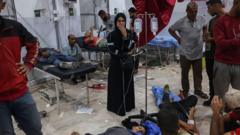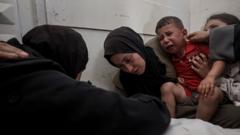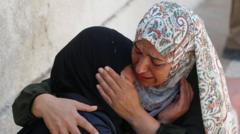As violence escalates in Gaza, the UN has labelled the current aid distribution methods a "death trap," following incidents where dozens were killed by Israeli gunfire while seeking relief. Witnesses share harrowing accounts, and humanitarian organizations question the efficacy and morality of the ongoing operations.
UN Decries 'Death Trap' of Gaza Aid Distribution Amid Ongoing Violence

UN Decries 'Death Trap' of Gaza Aid Distribution Amid Ongoing Violence
Recent attacks in Gaza spotlight challenges in the humanitarian response, with the UN condemning the food distribution system as increasingly lethal.
At least 46 people have died in two separate incidents while waiting for aid in central and southern Gaza, according to local hospitals and rescuers. UN representatives have harshly criticized the US and Israel-backed aid distribution framework, calling it "an abomination" and labeling it a "death trap" for civilians. Such deaths have become alarmingly frequent, particularly since Israel intensified military actions against Iran over a week ago. Excluding the most recent fatalities, it’s reported that over 410 Palestinians have been killed since the Gaza Humanitarian Foundation (GHF) commenced operations in late May.
Umm Raed al-Nuaizi, a widow whose son was shot while attempting to secure food for his family, lamented, "Why are our children's lives seen as so cheap?" Her son sought basic necessities, only to find himself in critical condition post-shooting. Footage from the al-Awda hospital in Nuseirat depicted chaotic scenes as the wounded were rushed in, overwhelming the facility's capacity, with bags of food aid being brought in despite the danger.
Witnesses detailed heart-wrenching accounts of how thousands gathered at an aid distribution site in a designated military zone, only to be met with gunfire from soldiers. The Israel Defense Forces (IDF) insist that they were responding to an emerging threat but claim to be reviewing the matter. Notably, at least 25 additional deaths occurred in another incident involving a GHF site in southern Gaza.
As the situation grimly unfolds, the IDF maintains that it permits GHF to operate under a guise of autonomy in managing aid distribution, while the UN and other organizations accuse the GHF of undermining humanitarian principles by cooperating with Israeli military goals. A UN human rights officer condemned Israel's militarized aid delivery as contradictory to global humanitarian standards, raising concerns over whether these practices constitute war crimes.
In Berlin, Philippe Lazzarini of the UN relief agency Unrwa vehemently criticized the existing aid framework, calling it a "death trap" that exacerbates the suffering of vulnerable populations. He expressed concern over the inadequacy of food supplies, drawing attention to the dire famine conditions rampant in Gaza, which only worsen as violence stifles access to essential resources.
Though Israel has recently allowed some humanitarian aid to enter Gaza, the volume is deemed insufficient amid escalating needs. Residents, like a father of four, described finding solace in mere bread and salt, emphasizing their fear of death surrounding the aid centers, often referred to as "death zones" due to the risks associated with accessing them.























